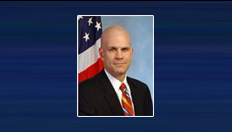Radio Interviews
-
The Chairman of the Recovery, Accountability and Transparency Board tells Federal News Radio that reporting has never been higher and talks about the future of federalreporting.gov in the cloud.
April 20, 2010 -
There\'s a blog, sponsored by the Transportation Security Administration, to facilitate an ongoing dialogue on innovations in security, technology and the checkpoint screening process. Kristin Lee, Assistant Administrator in the Office of Communications and Public Affairs, explains.
April 20, 2010 -
Ideas range from sending letters to public employees to organizing a celebration showcasing the work of government agencies in your local area. Tom Fox, Director of the Partnership for Public Service\'s Center for Government Leadership, explains them to us.
April 20, 2010 -
U.S. energy companies and manufacturers are adamant that the Senate climate bill pre-empt the states and the EPA\'s Clean Air Act authority to control greenhouse gases. National Journal\'s Margaret Kriz Hobson, energy and environmental correspondent has details.
April 20, 2010 -
Digital copiers pose security danger, \'kindergarten hacker\' cracks teacher\'s password
April 20, 2010 -
TSP website target date may slip, Wounded troops delayed by ash, HHS publishes list of patient data breaches, GSA plans spiffy new HQ
April 20, 2010 -
Special Rebroadcast! Richard Haley II Assistant Director and Chief Financial Officer, FBI\'s Financial Division
April 20, 2010 -
Federal agencies are increasingly turning to the tools of social collaboration, and doing it in a way that fits the mission of the organization.
April 19, 2010 -
Committee Chairman Ike Skelton says fixing the acquisition system at the Department of Defense is a bipartisan goal.
April 19, 2010 -
Learn more during this week\'s show, when host John Gilroy talks with Randy Lemke, CEO at InfoComm. April 20, 2010
April 19, 2010 -
Value Engineering (VE) is a function analysis process to identify actions that reduce cost, increase quality, and improve mission capabilities across the entire DoD enterprise. Nick Torelli, Deputy Director for Mission Assurance tells us about what it takes to be a winner.
April 19, 2010 -
As cybersecurity grows in importance to national security, the nation\'s three major military academies are teaching students how to be effective cyber warriors, both by defending and attacking computer systems. Andrew Phillips, the Naval Academy\'s chief academic officer, said the computer science department is running its first cybersecurity course for students who are not computer science majors.
April 19, 2010 -
Randy Larsen brings us up to speed on improvised nuclear devices with Dr. Peter Zimmerman, former chief scientist at the Senate Foreign Relations Committee.
April 19, 2010 -
The plan includes the specific actions DOI will undertake to incorporate the key principles of transparency, collaboration and participation into its core mission. Deputy Assistant Secretary Andrew Jackson from the Office of Technology, Information and Business Services explains.
April 19, 2010 -
USNA creates Center for Cyber Security Studies, McAfee Cybercrime Fighter Award goes to an FBI fed
April 19, 2010




